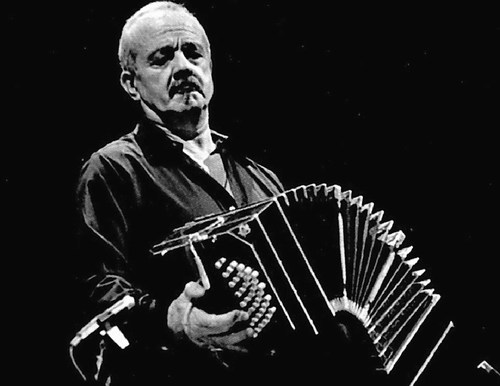Festival Miami offers a generous Piazzolla sampler

Astor Piazzolla
Festival Miami presented a lively evening of music by Astor Piazzolla on Friday, attracting a large audience to the University of Miami Gusman Concert Hall. Unlike most programs devoted to music by this master of nuevo tango, the concert placed Piazzolla’s most popular tangos in the context of his larger creative output.
Although the combination of flute and guitar is traditional tango instrumentation, Piazzolla wrote only one score for that duo. Historie du Tango spans the composer’s own creative journey from 1920’s dance music to neo-Baroque and avant garde musical cross-currents. Ably accompanied by guitarist Rafael Padron, flutist Trudy Kane wove the winding lines of “Cafe 1930” with tonal radiance and brought impeccable musicianship to the triple-tongued, jazz-laced romp of “Nightclub 1960.”
The plaintive, lyrically expansive melody of Milonga sin Palabras soared in Craig Morris’ mellow trumpet tones. For Tres Piezas Breves, Morris switched to the ewi (electronic wind instrument). Sounding like an electric saxophone, the instrument was expertly manipulated by Morris who spun a lovely long melodic line. Predating Piazzolla’s studies with Nadia Boulanger, the three-movement 1944 suite is a wonderfully austere, Gallic-inspired evocation.
Le Grand Tango, written for Mstislav Rostropovich in 1990, is an edgy, virtuosic tour de force. Cellist Ross Harbaugh handled the hairpin leaps in registers and sudden rhythmic curves with brilliant assurance, displaying honeyed tone and elegant phrasing in the broadly melodic sections. Frost School of Music dean Shelton Berg dazzled in keyboard partnership, playing jazzy strokes with wild abandon.
Four for Tango, the meeting of nuevo tango and Stravinsky’s Le Sacre du Printemps, was commissioned by the boundary-pushing Kronos Quartet. The Bergonzi String Quartet tore into the impish dissonances, raw harmonies and bow scrapes of this wry concoction. Robert Weiner’s lustrous oboe tone matched the quartet’s melancholy reading of the haunting Oblivion and Ave Maria from Piazzolla’s score for the 1994 Marcello Mastroianni film Enrico !V.
JP Jofre proved a master of the bandoneon, Piazzolla’s signature concertina instrument with two keyboards. Recreating the visceral charge of Piazzolla’s legendary quintet concerts and recordings, Jofre led a high-tech combo in four of the composer’s most popular tango creations. Violinist Tomas Cotik channeled tones both lush and astringent and Naoko Takao’s pianistic eruptions were fleet and intense. By turns harsh, insistent and softly caressing, Jofre’s bandoneon was first among equals, particularly in his own moody, emotionally dark introduction to Verano Porteno.
Posted in Performances
Leave a Comment
Sat Oct 6, 2012
at 12:15 pm
No Comments






